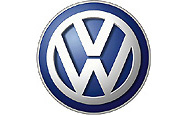Volkswagen Sustainability Report 2013
 |
Winterkorn and Osterloh present interim assessment of the economic, environmental and social responsibility of the Group
Wolfsburg--May 7, 2014: The Volkswagen Group continues to make significant progress on the way to becoming the world’s most environmentally compatible automaker. This is documented by the new sustainability report published today. The report, which consists of 152 pages, provides information on the progress achieved in economic, environmental and social sustainability in 2013.
“This report is a business card of our Group. It demonstrates our long term motives and motivation on the basis of clear figures and many examples – we are committed to responsible action with a long-term orientation,” said Prof. Dr. Martin Winterkorn, Chairman of the Board of Management of Volkswagen Aktiengesellschaft: “At Volkswagen, we do not want to achieve rapid success at the expense of others. We aim for solid, sustained growth that brings benefits to everyone: customers and investors, the environment and society, and last but not least our employees.” He added that sustainability meant “quality of life and future orientation” for Volkswagen and was a “core element of the Group’s business” and not simply an “alibi”.
Bernd Osterloh, Chairman of the General and Group Works Council of Volkswagen Aktiengesellschaft, stated: “Our responses to environmental and climate protection challenges increasingly have a decisive impact on employment and the future security of jobs. As employee representatives, our role is also to provide impetus with a view to bringing forward projects and changes that aim for greater environmental compatibility.”
The report shows how Volkswagen measures, controls and improves the progress achieved in the field of sustainability. Among other topics, it provides information on the broad range of efficient, affordable and practicable fuel and powertrain technologies, the expansion of sustainability and supplier relations and the implementation of uniform global quality standards for specialist training and employee qualifications. Topics that are covered in detail include the role of the company’s modular toolkit strategy in the achievement of emission targets, the export of the dual vocational training model throughout the world and the contribution of Volkswagen accident research to road safety as well as the role of local added value in regional development and economic growth.
In the reporting year 2013, energy consumption per vehicle produced was 12.5 per cent below the figure for the base year of 2010, while CO2 emissions were 19.5 per cent lower. The Group takes one-third of its electric power from renewable sources. Almost two-thirds of vehicles delivered in Europe by the Volkswagen Passenger Cars and Commercial Vehicles, Audi, SEAT and ŠKODA brands had emissions below 130 g CO2 / km in 2013. Experts from Group brands work together on life cycle engineering projects in order to develop standardised methods for harmonised life cycle assessments of vehicles throughout the Group.
The report is available to download from Volkswagen Report where you can also view a ‘100 second’ video summarising the report’s key findings.


